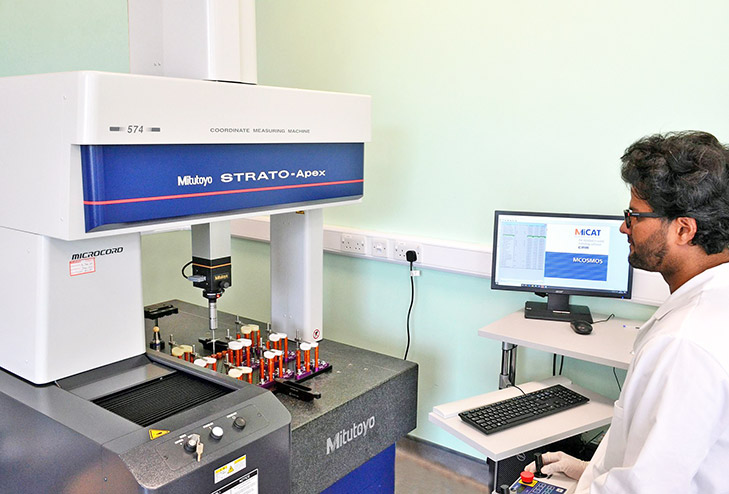Medical grade metrology from Mitutoyo
Newcastle-upon-Tyne based ExplantLab is an independent research organisation that is focused on improving the performance of medical implants such as hip and knee replacements. The company combines extensive surgical, bioengineering and medical knowledge to understand the performance of medical implants that have been removed from a patient’s body (explants).
Implants can fail and need to be removed for a number of reasons. When explants are submitted to ExplantLab, the company’s staff employ a range of advanced technologies to reverse engineer them and to accurately determine their ‘as-new’ shape.
By comparing explants’ reconstructed original forms with their shapes following removal, the amount of material that has been removed whilst in patients’ bodies can be accurately calculated. This process allows the precise mapping of wear patterns and enables all findings to be linked to various design, surgical and patient factors. By combining the knowledge gained from the precise examination of explants, deductions can be reached related to how and why various devices have performed well or poorly.

Given ExplantLab’s need for precision, for several years the company has used a highly accurate Mitutoyo Legex 322 coordinate measuring machine (CMM) for reverse engineering explants. The success of the business and the ever increasing volume of this type of work recently prompted the purchase of a second Mitutoyo CMM.
ExplantLab director, David Langton explains: “ExplantLab is an independent company with no contracts with manufacturers which differentiates us in the UK. As trusted independent investigators, our aim is to improve the quality, effective functioning and longevity of future medical devices.
“In addition to the knowledge and skill of our staff, the accuracy of our findings is determined by the range of advanced technologies we use, such as the Mitutoyo Legex 322 CMM. Mitutoyo equipment is reliable and accurate – but equally as important, the service and support we get from the company is exemplary.
“When the need arose for an additional CMM, we got in touch with Mitutoyo UK and following consultation, decided that a Strato Apex 574 CNC CMM with an XYZ capacity of 500 x 700 x 400mm was the ideal solution to our accuracy and speed of scanning needs.”
The new CMM has a large component support, so company staff are now able to load multiple explants onto the machine and perform rapid, fully automated, CNC reverse engineering routines.
A typical use for the Strato Apex 574 is the scanning of explant bearing surfaces to establish multiple data points for in-depth analysis. Automated programmes allow the CMM to distinguish between the unworn parts of bearing surfaces and determine their precise as-new geometries. From unworn areas, the original geometries of the components can be reverse engineered. By comparing the actual surface (the post revision geometry) of a component to the original (as manufactured) surface, the magnitude of wear can be calculated and accurately mapped.
To ensure that Mitutoyo’s wide range of CMMs are able to cover practically all precision 3D measuring applications, they are available in a variety of sizes and accuracy classes along with a wide range of contact and non-contact probes and other accessories. Complementing the hardware, Mitutoyo’s easy to use, feature-rich analysis software rapidly interprets measurement results.
High-speed and accuracy on the Strato-Apex CMM are aided by the ridged redesign of the machine, its guide mechanisms and the use of high precision scales. Strato-Apex series CMMs also feature a high-performance controller with a-s-a digital servo system to process control loops for position, speed, and current, all as digital signals.
As floor vibrations at or near a CMM can induce measurement variations, the Strato-Apex series is equipped with a vibration damping unit featuring auto-levelling air springs. This not only prevents floor vibrations from reaching the main unit, but also incorporates a function that uses a sensor to detect load changes caused by movements of the individual axes and the placement of a workpiece. This capability rapidly restores and maintains the horizontal orientation of the main unit.
David Langton concludes: “Following its trouble-free installation, in addition to delivering the demanding levels of precision scanning that we require, the new CMM has significantly increased ExplantLab’s operational efficiencies.
“When compared to our older model, we’re able to load many more explants onto the machine, then at the press of a button, start a rapid, fully automated mass scanning routine. On completion, comprehensive reports related to the precise status of each explant are then generated. Due to its generous capacity and excellent speed of action, the CMM is well-equipped to handle all our current and future needs.”